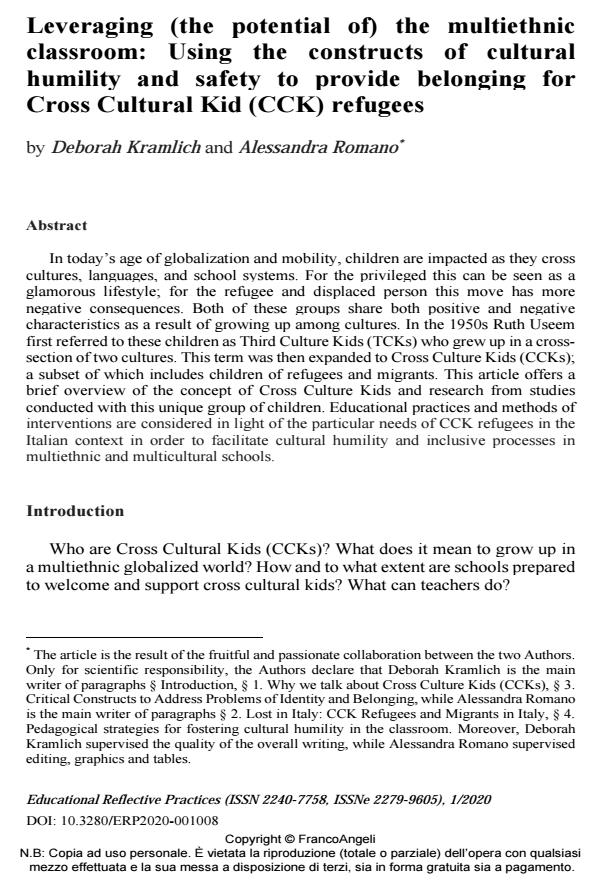Leveraging (the potential of) the multiethnic classroom: Using the constructs of cultural humility and safety to provide belonging for Cross Cultural Kid (CCK) refugees
Journal title EDUCATIONAL REFLECTIVE PRACTICES
Author/s Deborah Kramlich, Alessandra Romano
Publishing Year 2020 Issue 2020/1
Language English Pages 33 P. 146-178 File size 452 KB
DOI 10.3280/ERP2020-001008
DOI is like a bar code for intellectual property: to have more infomation
click here
Below, you can see the article first page
If you want to buy this article in PDF format, you can do it, following the instructions to buy download credits

FrancoAngeli is member of Publishers International Linking Association, Inc (PILA), a not-for-profit association which run the CrossRef service enabling links to and from online scholarly content.
In today’s age of globalization and mobility, children are impacted as they cross cultures, languages, and school systems. For the privileged this can be seen as a glamorous lifestyle; for the refugee and displaced person this move has more negative consequences. Both of these groups share both positive and negative characteristics as a result of growing up among cultures. In the 1950s Ruth Useem first referred to these children as Third Culture Kids (TCKs) who grew up in a cross-section of two cultures. This term was then expanded to Cross Culture Kids (CCKs); a subset of which includes children of refugees and migrants. This article offers a brief overview of the concept of Cross Culture Kids and research from studies conducted with this unique group of children. Educational practices and methods of interventions are considered in light of the particular needs of CCK refugees in the Italian context in order to facilitate cultural humility and inclusive processes in multiethnic and multicultural schools.
- Children and the Climate Migration Crisis: A Casebook for Global Climate Action in Practice and Policy pp.183 (ISBN:978-1-80455-913-0)
- La Student Measure of Culturally Responsive Teaching scale: adattamento e validazione per il contesto universitario italiano Nicolina Bosco, Loretta Fabbri, Mario Giampaolo, in EXCELLENCE AND INNOVATION IN LEARNING AND TEACHING 1/2022 pp.39
DOI: 10.3280/exioa1-2022oa13935 - Stay humble and enjoy diversity: The interplay between intergroup contact and cultural humility on prejudice Marika Rullo, Emilio Paolo Visintin, Stella Milani, Alessandra Romano, Loretta Fabbri, in International Journal of Intercultural Relations /2022 pp.169
DOI: 10.1016/j.ijintrel.2022.02.003 - Humble and Kind: Cultural Humility as a Buffer of the Association between Social Dominance Orientation and Prejudice Emilio Paolo Visintin, Marika Rullo, in Societies /2021 pp.117
DOI: 10.3390/soc11040117
Deborah Kramlich, Alessandra Romano, Leveraging (the potential of) the multiethnic classroom: Using the constructs of cultural humility and safety to provide belonging for Cross Cultural Kid (CCK) refugees in "EDUCATIONAL REFLECTIVE PRACTICES" 1/2020, pp 146-178, DOI: 10.3280/ERP2020-001008